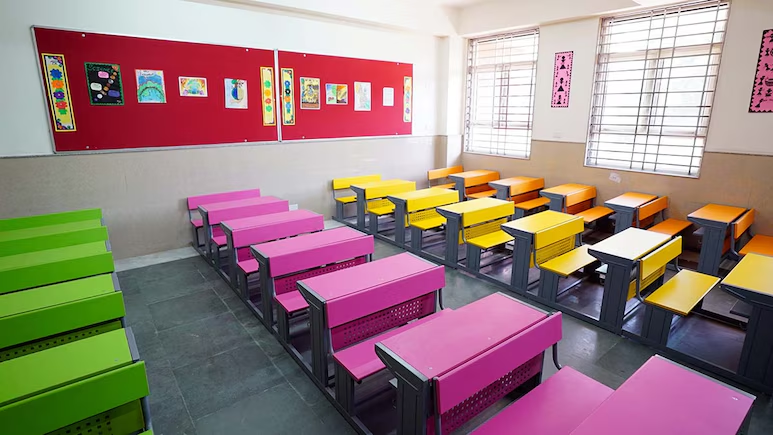
Online learning may be undertaken for not more than two sessions of 30-45 minutes each on the days for classes 1 to 8 while it cannot be more than four sessions of 30-45 minutes each on the days for classes 9 to 12, the education ministry said on Tuesday as it announced guidelines for online classes by schools, and recommended a cap on duration and the number of sessions in a day for students.
The guidelines have been framed by the ministry, following concerns raised by parents about schools conducting online classes like regular schools, which has increased children's screen time after the COVID-19 pandemic mandated a shift from classroom teaching to online learning as schools continue to remain shut for over four months.
In the guideline called "Pragyata", the Ministry of Human Resource Development (MHRD) has recommended that the duration for online classes for pre-primary students should not be for more than 30 minutes.
Recommended screen time
Class | Recommendation |
Pre Primary | On a given day for interacting with parents and guiding them, not more than 30 minutes. |
Classes 1 to 12 | Recommended to adopt/adapt the alternative academic calendar of NCERT at http://ncert.nic.in/aac.html |
Classes 1 to 8 | Online synchronous learning may be undertaken for not more than two sessions of 30-45 minutes each on the days the States/UTs decide to have online classes for primary sections |
Classes 9 to 12 | Online synchronous learning may be undertaken for not more than four sessions of 30-45 minutes each on the days as decided by States/UTs. |
HRD Minister Ramesh Pokhriyal ‘Nishank' said that COVID-19 pandemic has led to closure of schools and has impacted over 240 million children of the country who are enrolled in schools. Extended school closures may cause loss of learning.
“To mitigate the impact of the pandemic, schools will not only have to remodel and reimagine the way teaching and learning have happened so far, but will also need to introduce a suitable method of delivering quality education through a healthy mix of schooling at home and schooling at school,” he said.
The minister highlighted that the guidelines will be relevant and useful for a diverse set of stakeholders including school heads, teachers, parents, teacher educators and students.
The guidelines stress upon the use of alternative academic calendar of NCERT, for both, learners having access to digital devices and learners having limited or no access, a statement from the HRD Ministry said.
Universities and schools across the country have been shut since March 16, when the Centre announced a countrywide classroom shutdown as part of measures to contain the COVID-19 outbreak.
A nationwide lockdown was announced on March 24, which came into effect the next day. While the government has largely eased restrictions, schools and colleges continue to remain closed.
(With PTI Inputs)
